If a plant told you to jump off a cliff … would you?
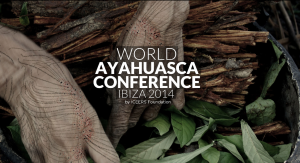 Recently, I attended the 2014 World Ayahuasca Conference in Ibiza, Spain. It was an excellent conference for me, seeing old friends I had not seen since before prison, meeting new and exciting minds on the cutting edge of psychedelic science, and being present for Charlotte Walsh’s clarion call for Cognitive Liberty, the right to think for myself under the influence of whatever psychoactive I see fit. I think this position is more intellectually rigorous for its avoidance of exceptionalism or pharmacochauvanism. Rather than rely on special pleadings claiming how “my” allegedly ‘sacred’ use of “Mama Aya” deserves legal protection whilst “your” non-religious use of psychoactive drugs does not, Cognitive Liberty, as a concept, aims square in the heart of what Jacob Sullum said in Saying Yes, In Defense of Drug Use:
Recently, I attended the 2014 World Ayahuasca Conference in Ibiza, Spain. It was an excellent conference for me, seeing old friends I had not seen since before prison, meeting new and exciting minds on the cutting edge of psychedelic science, and being present for Charlotte Walsh’s clarion call for Cognitive Liberty, the right to think for myself under the influence of whatever psychoactive I see fit. I think this position is more intellectually rigorous for its avoidance of exceptionalism or pharmacochauvanism. Rather than rely on special pleadings claiming how “my” allegedly ‘sacred’ use of “Mama Aya” deserves legal protection whilst “your” non-religious use of psychoactive drugs does not, Cognitive Liberty, as a concept, aims square in the heart of what Jacob Sullum said in Saying Yes, In Defense of Drug Use:
Seeking a medical or religious exemption from drug prohibition amounts to asserting that my use of this substance is important, that it deserves respect in a way that more frivolous uses do not … The urge to offer such excuses is based on the sense that drug use is morally suspect without an elaborate and serious sounding defense … Wine drinkers generally do not feel compelled to proclaim that their beverage was endorsed by God, that it relieves anxiety or reduces their risk of heart disease. They simply say, “I like a nice glass of wine.”
Saying this, I do not deny the anxieties relieved nor the genuine insights produced in moments of awe, reverence and inspiration under the influence of psychoactive drugs like ayahuasca. Having experienced these effects first hand, I can see why one would make appeals for such religious exemptions when pushed into a corner by the State or its agents.
Yet, here in the spiritual home of the Church of Prohibition, these justifications may become untenable as more and more disparate groups use the Religious Freedom Restoration Act (RFRA) to seek exemptions from a variety of generally applicable laws. Using the RFRA, corporations can become a law unto themselves. This contradicts both constitutional tradition and common sense: it asserts a private right to ignore laws generally applicable to everybody else.
According to the Supreme Court, the RFRA exempts:
- the Native American and Uniao de Vegetal churches from provisions in the Controlled Substances Act
- religious institutions from provisions in anti-discrimination laws
- corporations, like Hobby Lobby, from the birth control provisions in the Affordable Care Act
- religious congregations from laws prohibiting animal ‘sacrifice’
- religious medical personnel from providing legal medical services to patients
The RFRA has become an excuse for superstition, sectarianism and bigotry. As it continues to gather public scorn, I predict the RFRA will collapse under it’s own folly.
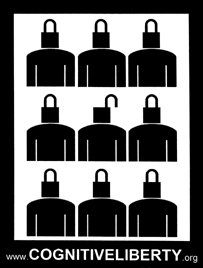 In seeking exemptions under the RFRA, religious groups must present a belief system, complete with metaphysical or supernatural ideas, acceptable to the judges. This presents a fundamental conflict, I think that justifying my use of psychoactives to the State, especially by a claim to supernaturals, is unnecessary, counterproductive and suspect. In my opinion, it is way past time for the Cognitive Liberty social movement Ruiz-Sierra called for:
In seeking exemptions under the RFRA, religious groups must present a belief system, complete with metaphysical or supernatural ideas, acceptable to the judges. This presents a fundamental conflict, I think that justifying my use of psychoactives to the State, especially by a claim to supernaturals, is unnecessary, counterproductive and suspect. In my opinion, it is way past time for the Cognitive Liberty social movement Ruiz-Sierra called for:
Cognitive liberty as a concept exposes the argument that the drug policy reform movement has conspicuously shied away from making: namely that drug prohibition is untenable because it infringes freedom of thought, the fundamental principle that underlies so many other constitutional guarantees.
In delivering the majority opinion in Palko v Connecticut (1937), US Supreme Court Justice Benjamin Cordozo made it clear:
freedom of thought … is the matrix, the indispensable condition, of nearly every other form of freedom. With rare aberrations a pervasive recognition of that truth can be traced in our history, political and legal.
When one understands that Cognitive Liberty is antecedent to religion, one recognizes that these ‘sacred’ belief systems, these justifications, each start with thought. So it matters not what you believe, that you consent to alter your own mental functioning with drugs is enough for Cognitive Liberty to trump the absolute prohibitions of the Controlled Substances Act 1970 or other similar legislation.
*
At the Ayahuasca Conference, after listening to umpteen people tell me what “Mama Aya” had told them — she told me this, she told me that — I was struck by more than a few thoughts. Many of these tales were of the more mundane nature of what to eat, who to break up with, who to get together with, what career to pursue, how to handle some tricky inter-personal situation, and so on. But more than a few of these stories were of a fantastical nature, about how the spirit of ayahuasca had facilitated talking with long dead ancestors, how through ayahuasca they had gained access to a higher spiritual plane where they made contact with extra-dimensional beings who acted as guides or healers. I started to wonder if these people had pondered the role their imagination and cultural conditioning may have played in their visions. At times I was reminded of conversations with young children, who often struggle to distinguish between dreams and reality.
In Psychedelic Information Theory – Shamanism in the Age of Reason, James Kent writes:
[E]rroneous psychedelic information claiming species-level importance has negative cultural value and dilutes the overall information marketplace, making psychedelic information almost statistically worthless.
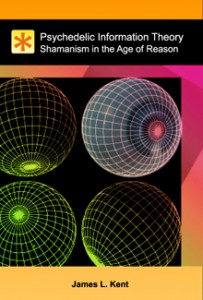 And in case anyone was confused as to what Kent was aiming at, he included an explanatory note:
And in case anyone was confused as to what Kent was aiming at, he included an explanatory note:
The psychedelic community produces a new guru every decade or so, and the cultural contributions of these gurus trends from pseudo-scientific to outright fantastical. It is often difficult to tell if the contributions of psychedelic celebrities outweigh the more nonsensical memes they propagate.
As I experience it, the greatest gift of psychedelics is their ability to free our minds by helping us see the shifting vibrational nature of things; they remove solidity, they remove certainty. So why do so many in the psychedelic community wind up with attachments to off-the-peg, cookie-cutter belief systems, complete with extra-dimensional beings, machine elves, aliens, crop circles, ufos … you get the idea?
In this time of global economic and ecological meltdown, we need great minds working on great thoughts. The last thing we need or want is people using these tools and ending up back in the superstitious world views that rationality escaped from in the enlightenment era.
*
Whilst in prison for disobeying laws based on superstitious ideas of drugs enslaving people or facilitating too much freedom from authority, I was busying myself with writing a book, yet to be properly published. In the process, I was digging into Stan Grof’s Basic Perinatal Matrices and musing about the Abrahamic Genesis myth being a covert description of the birth experience, thrusting each of us, alone and cold, into a meaningless world where we would eventually discover our mortality and terrorize ourselves with that awareness.
In the course of my studies, I stumbled into a phrase and a line of thinking that apparently got Otto Rank kicked out of Freud’s metaphorical garden: “separation anxiety,” from our mother’s womb, from a mystical union with the cosmos, from the human community. A lot of us reading this have taken an assortment of drugs to experience that mystical union and thus salve our very separation anxiety. Rank’s crime was to observe that our inability to cope with these anxieties was the source of our neuroses, not sex as Freud would have it. On this, Rank said:
Life is a ‘mere succession of separations’: beginning with birth, going through several weaning periods and the development of the individual personality, and finally culminating in death — which represents the final separation. At birth, the individual experiences the first shock of separation, which throughout his life he strives to overcome. In the process of adaptation, man persistently separates from his old self, or at least from those segments of his old self that are now outlived. Like a child who has outgrown a toy, he discards the old parts of himself for which he has no further use … The ego continually breaks away from its worn-out parts, which were of value in the past but have no value in the present. The neurotic [… appears] unable to accomplish this normal detachment process … Owing to fear and guilt generated in the assertion of his own autonomy, he is unable to free himself, and instead remains suspended upon some primitive level of his evolution.
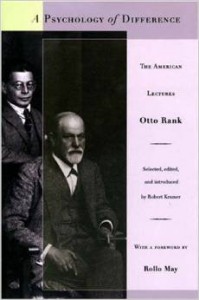 Unlearning necessarily involves separation from one’s self-concept, as it has been culturally conditioned to conform to familial, group, and institutional allegiances. According to Rank, unlearning or breaking out of our shell from the inside is “a separation [that] is so hard, not only because it involves persons and ideas that one reveres, but because the victory is always, at bottom, and in some form, won over a part of one’s ego”.
Unlearning necessarily involves separation from one’s self-concept, as it has been culturally conditioned to conform to familial, group, and institutional allegiances. According to Rank, unlearning or breaking out of our shell from the inside is “a separation [that] is so hard, not only because it involves persons and ideas that one reveres, but because the victory is always, at bottom, and in some form, won over a part of one’s ego”.
Pondering this with a headful of medical and religious anthropology, I noted that birth, death, ostracism, scapegoating, loss of self-esteem or status, loss of love in a relationship, even loss of innocence are the general human separation anxieties in need of salvation. In an attempt to salve these anxieties, religions constellate rituals around these universal human experiences.
*
I am firmly of the opinion that the “ego-death” I experienced on psychedelics has helped prepare me for my uncertain but inevitable demise, my separation from the human community. Nevertheless, this has yet to shield me from an occasional terrifying thought: “oh shit, I’m another breath closer to death”. Though I accept that all beings on this planet will cease to exist as the sun envelopes the earth, I am not free from the unconscious and conscious influences my awareness of death has on me.
And so it was that after my release from prison, Charlotte and I decided to watch Flight from Death: a documentary, derived from Ernest Becker’s Pulitzer Prize winning book The Denial of Death, reporting on the findings of psychologists studying Terror Management Theory (TMT). According to TMT, people suffer cognitive dissonance or anxiety when they are reminded of their mortality. (You may be feeling it now). TMT proposes a basic psychological conflict resulting from having a desire to live but realizing death is inevitable. This conflict produces terror, and is believed to be unique to human beings, as is the solution: culture.
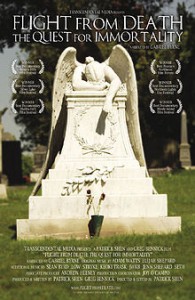 TMT holds that cultures are symbolic systems that act to provide life with meaning and value that serve to manage the terror of death. The simplest examples of the cultural management of our death terror appear those that purport to offer literal immortality (e.g. belief in afterlife). Through terror management, individuals are motivated to seek consonant elements – symbols that make sense of mortality and death in satisfactory ways, such as boosting self-esteem, making humans important, and so on.
TMT holds that cultures are symbolic systems that act to provide life with meaning and value that serve to manage the terror of death. The simplest examples of the cultural management of our death terror appear those that purport to offer literal immortality (e.g. belief in afterlife). Through terror management, individuals are motivated to seek consonant elements – symbols that make sense of mortality and death in satisfactory ways, such as boosting self-esteem, making humans important, and so on.
This is what I believe those who make up stories of the “sacredness” or “divinity” of psychedelics are doing. I know: for many years, I did so too. Rather than taking responsibility for attributing these qualities to the plants, many people assert that psychedelics, particularly ayahuasca, are some sacred intelligence in communion with us. Ultimately, this has us not be alone, adrift in a world of post-modern meaninglessness, and shifts the conversation to some other realm where we are an elite special group that will be safe in the coming apocalypse as we transform to a new level of consciousness.
*
I too struggled with my ayahuasca visions. I had one particularly long messianic journey whereby I was the “one” who could see the entire evolutionary script, past and future, and thus it was my responsibility to save humanity. I was interpreting my visions through some syncretic mixture of millenarianist apocalypse and Judeo-Christian non-sense spurned on by Jose Arguelles’s interpretations of the Mayan calendar conjunct Terence McKenna’s Time Wave Zero. If they would only listen to me …
 I had failed to distinguish my imagination from reality. It took several months for me to separate what happened from what I made up about it, to see my cultural conditioning with its viral memes giving meaning to my visions and thus to me. But having experienced ego transcendence, where my niggling worries dropped away, a sense of bliss and energy flow enveloped me in a unio-mystical type experience. I equated the horrible ruthless love I felt with an unfathomable intelligence permeating all. As I picked up the pieces of my sacred tantraum, I stumbled back into a mortal body with discrete limitations: no-one was listening me as the savior my visions said I was. I had experienced an entheogenesis but the unfathomable intelligence had lied, I was not the all-powerful savior of the world, I had not become God!
I had failed to distinguish my imagination from reality. It took several months for me to separate what happened from what I made up about it, to see my cultural conditioning with its viral memes giving meaning to my visions and thus to me. But having experienced ego transcendence, where my niggling worries dropped away, a sense of bliss and energy flow enveloped me in a unio-mystical type experience. I equated the horrible ruthless love I felt with an unfathomable intelligence permeating all. As I picked up the pieces of my sacred tantraum, I stumbled back into a mortal body with discrete limitations: no-one was listening me as the savior my visions said I was. I had experienced an entheogenesis but the unfathomable intelligence had lied, I was not the all-powerful savior of the world, I had not become God!
Sam Harris recently wrote in his new book Waking Up: a guide to Spirituality Without Religion:
It is quite possible to lose one’s sense of being a separate self and to experience a kind of boundless, open awareness — to feel, in other words, at one with the cosmos. This says a lot about the possibilities of human consciousness, but it says nothing about the universe at large. And it sheds no light at all on the relationship between mind and matter. The fact that it is possible to love one’s neighbor as oneself should be a great finding for the field of psychology, but it lends absolutely no credence to the claim that Jesus was the son of God, or even that God exists. [Or, that I am he.] Nor does it suggest that the “energy” of love somehow pervades the cosmos. These are historical and metaphysical claims that personal experience cannot justify.
Psychedelics are exceptional for unleashing repressed biographical material and working through it, for a therapeutic catharsis, but why did I so want them to be portals to the supernatural? Because as a member of the entheogenea, a race of beings recognizing they’re divinity, I was one of the few who had seen the Holy; and, it gave my life meaning and purpose.
*
Ayahausca in contemporary psychedelic culture starts with a myth: the plant spirits told the shamans to mix them together. (N.B. our astonishment at tribal people working out a two plant combo. This masquerades as lionisation — jaguarisation? — of indigenous cultures. In a different light this can be seen as deeply patronizing … they’re humans, just like us, of course they can work complicated shit out!) I have a new version of this myth requiring no plant spirits doing the talking. It starts with an article I recently received from the “I Fucking Love Science” team about a jaguar caught on film under the influence of the ayahuasca vine Banisteriopsis caapi. If you have studied american shamanism you might recognize the jaguar as the most sacred animal in their cosmologies, it’s also their biggest predator. So imagine this retelling of the great ayahuasca myth: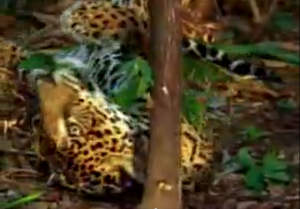
A shaman out on a hunt sees a jaguar apparently writhing in some trance on the ground. (Having visions of humans, I presume). Curious, he wonders what’s up. He gathers some of the leaves and makes a brew or simply just copies the jaguar and eats the leaves right there. He experiences a psychoactive effect, kills the jaguar, skins it, and wears it as he returns to the village having found a new psychoactive and conquered his tribe’s mortal enemy. As he shares his new wares with the tribe he decides to snort some DMT snuff he’d prepared earlier … ayahuasca is born, myth gets lost.
Everything I have written may be wrong. I have of course just made this new myth up. In the face of my mortality it is my tendency to make shit up, to search for certainty. When I was young, I wanted to see entities, I wanted certainty that they were there, that I was not alone, even if some of those entities were malevolent. In my search for certainty, I lost my ability to sit with the mystery of it all. Occasionally, in meditation or under the influence of exogenous psychedelics, I represence the mystery: in that ineffable wonder, I am free.

